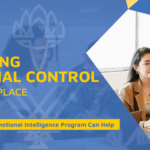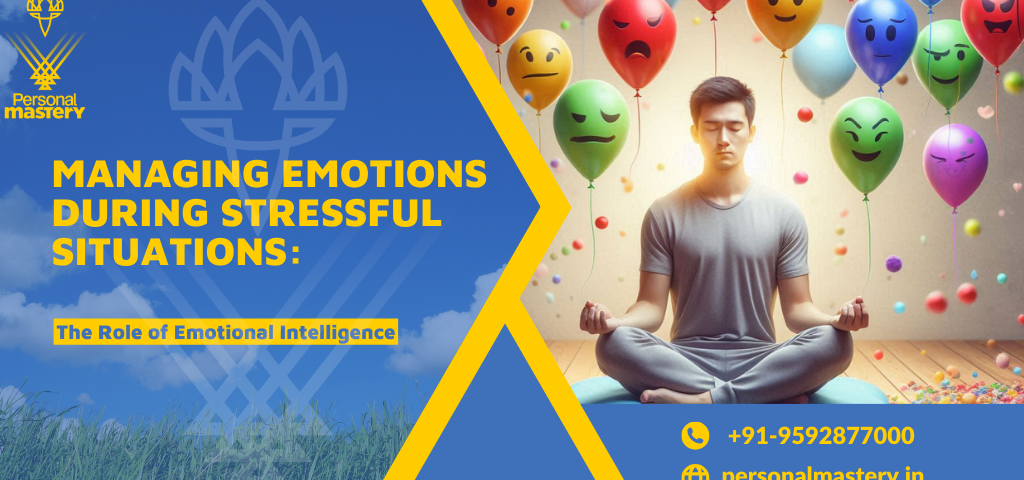
Mastering Emotional Control in the Workplace: How Leadership and Emotional Intelligence Program Can Help
October 29, 2024
Top Skills to Master for Professional Communication Success
November 12, 2024Stress is an experience that is common to everyone in various forms. Some people perform better under pressure, while others become powerless by it. Managing emotions in stress involves not just emotional regulation but also actual emotional intelligence ability to understand, control, and manage emotions in beneficial ways. This skill could make a whole lot of difference when it comes to dealing with all sorts of emotionally taxing situations- having control of one’s emotions, stabilizing oneself, or becoming more resilient in the face of setbacks.
In this blog, find out how to develop emotional intelligence through targeted training-enhanced certification on emotional intelligence, a leadership skills course aimed to equip people with skills, knowledge, and effective tools to deal with stressful situations. A case study on one Indian professional’s story shall also be shared with several tools and tips for working with emotional regulation.
Understanding Emotional Intelligence
Emotional intelligence involves the capacity to be aware of, regulate, and express one’s emotions and handle interpersonal relations judiciously and with empathy. It is significant for personal and professional success. Research suggests that high EI gives one an upper hand in handling stress, managing relationships, and making decisions while under pressure.
As awareness grows for the importance of EI as a tool for professional success, emotional intelligence certifications are becoming increasingly popular. These programs often cover a broad spectrum of competencies, including emotional mastery, self-regulation, empathy, and leadership skills.
The Importance of Emotional Intelligence in Professional Development
Stress-out levels observe the entire workspace in corporate settings. Leaders, perhaps more than any others, are pressured to make snap-wrong decisions, usually undergo-getting conditions for the bigger organization. This can greatly help Leadership Coach Certifications and Professional Development Training to hone one’s skills for emotional regulation and leading others under duress or resiliently.
Investing in leadership and supervisory skills, which includes teaching and handling relationships in workplaces and beyond, means that one can not only survive but thrive in the most stressful situations. In this regard, techniques for anchoring oneself, listening to and understanding someone else’s point of view, and using creative techniques for working through problems are taught. That, coupled with reinforced self-awareness, a prerequisite for managing emotional responses.
Common Challenges in Managing Emotions During Stress
Stress, by nature, triggers automatic responses that exist in a react-and-file mode, such as frustration, anxiety, or, for some, anger. For them, it is hard-hitting too, sometimes shoving them to succumb to irrational decisions or snap relationships. Here are some suggestions about some of the problems people may face:
- Difficulty in Identifying Emotions: Some people have trouble naming or providing appropriate and constructive descriptions of their emotions. If you do not realize there’s a hard stop in your self-awareness, your first reaction could as well be past that soft bend.
- Difficulty in Regulating Emotions: Some people might be somewhat aware but do not know how to rewire their devices.
- Difficulty Staying on Task: Stress clouds judgment and many do not manage to concentrate or think at all.
- Strained Relationships: Stress sometimes brings clouds on interpersonal relationships with peers, friends, or even family, especially if he has not cultivated empathy toward the other or self-first.
This is where Emotional Intelligence Coaching pays off. With the assistance and guidance of an expert coach, you can identify the emotional triggers, regulate your responses, and cultivate resilience.
Case Study: Rajesh’s Journey to Emotional Mastery
Let us study the case of one such individual, Rajesh, a project manager in a Bengaluru-based IT company. While Rajesh was a technical expert, his team often found him unapproachable, especially during the point of high tension when projects were up for deadlines. His inability to manage stress and his harsh response in high-stress situations created tension in the work environment.
Rajesh joined an Emotional Intelligence Program run by Prabhleen Gupta Trainer certified coach specializing in Leadership and Emotional Intelligence skills. Throughout the extensive program, Rajesh learned several basic concepts:
- Self-Awareness: Rajesh learned to identify his emotional triggers and understand the source of his stress. He began maintaining a journal to track his reactions in stressful situations, which allowed him to recognize patterns in his behavior.
- Self-Regulation Techniques: He has employed breathing and mindfulness exercises in his work to keep his emotions in check. Pausing to breathe for a few moments before speaking out helped him keep calm and composed.
- Sympathetic and Better Communicator: Rajesh improved his communication by being more empathetic. He became good at listening to his teammates, understanding their perspectives, and responding with empathy rather than frustration.
- Conflict Resolution Skills: The program also equipped Rajesh with conflict resolution techniques. He learned to approach issues in a constructive manner instead of defensively.
Above all, over time, Rajesh experienced some change. He became much more approachable to his team, and with his newly developed emotional regulation skills, he managed high-stress projects more easily. His journey is an illustration of how emotional mastery can change lives, and the underlying role of professional training leading toward that end.
Practical Tips for Managing Emotions During Stress
- Self-understanding: This is the foundation for emotional intelligence. Identifying emotions and causes triggering some emotions will allow them to better manage such a situation. You can try keeping an emotion journal or remind yourself every other day of what your emotions were, what caused them, and how you behaved afterward.
- Adopt and Use Self-Regulation Techniques: Realizing one’s behavior simply goes well beyond the knowledge of emotions and urges. There comes a need for a conscious effort toward managing them. Techniques like deep breathing, mindfulness meditation, and progressive muscle relaxation are recommended. These techniques are actually items often handed over to the participants by Personal Mastery and Prabhleen Gupta Trainer in the training regimens taught by them.
- Develop Empathy: The other feature of emotional intelligence is having enough empathy to allow others to see somewhere else. This is a beautiful trait to develop in one’s personhood, especially in any stressful environment. Therefore managing any reactions will become rather easier and constructive. This skill is even more so important for leaders since it helps them build a stronger team that tends to support each other.
- Keep on Training: Attending Leadership Skills Development training or Professional Development Training would be yet another responsible way in which you could allow yourself to improve emotional intelligence throughout your life. Such types of training would create the build-up of skills like resolving conflicts, interpersonal communication, and strategic thinking that would signal the improvement of stress-management competency within individuals.
- Set Yourself Limits: To conquer that overwhelming burden of all sorts of stress to stave off emotional burnout, just establish boundaries either with people or within those self-same environments. Work up to what defines those limits and express them to others. Expressing boundaries is one of the techniques often turned up in emotional intelligence training to build hearty relations.
- Seek Professional Guidance: Working with an Emotional Intelligence Coach, offers the opportunity of expediting your emotional growth. You not only get insights focused on your immediate difficulties and targets, but it also becomes easier to build effective skills for managing emotions.
Conclusion
Emotional control in terms of stressful situations is the one skill that can be developed through emotional intelligence and continuous professional development training. These may be other courses such as effective management skills and emotional intelligence certification or even leadership coach certification, all of which provide techniques to react to stress differently. Empathy, self-regulation, and self-awareness are essential, and such persons like Rajesh have proven that anyone can become a resilient and effective professional.
Every ounce of emotional knowledge puts you in a better position for personal growth and boosting your career, as you tend to be the competent guy with a cool head capable of tackling any challenge. So why not register for an Emotional Intelligence Program today, thus embarking on the road toward mastering emotions that lead to success both professionally and personally?
Contact Us
Phone: +91-9592877000
Email Id: support@personalmastery.in
Address: #748, Sector 9, Panchkula (Chandigarh), Haryana (INDIA) – 134113
FAQ’s
- What is emotional intelligence, and why is it important for managing stress?
Emotional intelligence (EI) is the ability to understand, regulate, and effectively use emotions. It’s essential for managing stress because it helps individuals stay calm under pressure, make thoughtful decisions, and handle interpersonal conflicts constructively. Developing EI can improve both personal and professional resilience in stressful situations. - How can emotional intelligence training help in handling stress?
Emotional intelligence training, such as Emotional Intelligence Certification or Leadership Skills Courses, teaches self-awareness, emotional regulation, empathy, and communication. These skills allow individuals to identify their emotional triggers, manage reactions, and interact more effectively with others, reducing stress in challenging situations. - What are some practical techniques to manage emotions during stress?
Techniques for managing emotions include deep breathing exercises, mindfulness practices, and progressive muscle relaxation. Additionally, journaling emotions and reflecting on triggers can help improve self-awareness. Training programs often include these techniques, providing structured guidance on how to use them effectively. - Can emotional intelligence improve relationships in high-stress environments?
Yes, emotional intelligence enhances empathy, listening skills, and conflict resolution abilities, all of which are crucial for building stronger relationships. This is especially helpful in high-stress environments where clear communication and understanding others’ perspectives can prevent misunderstandings and reduce tension. - Is emotional intelligence something that can be learned, or is it innate?
Emotional intelligence can definitely be learned and strengthened over time. While some people may have a natural inclination toward emotional awareness, skills like self-regulation, empathy, and effective communication can be developed through focused practice and training, such as Emotional Intelligence Coaching and Leadership Coach Certification programs.


